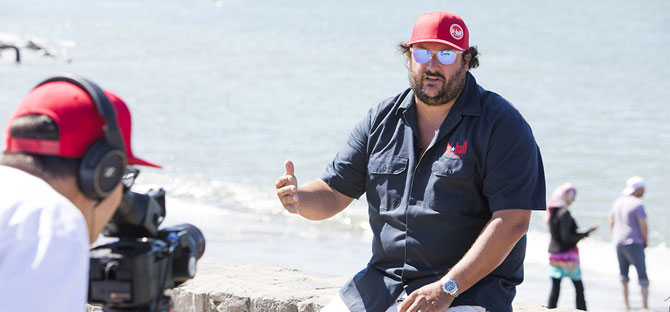
One year after inking a deal with coffee giant Starbucks, the world’s largest beer company is making another investment in the non-alcoholic beverage segment.
Anheuser-Busch InBev today announced plans to acquire Hiball Inc., a San Francisco-based beverage company founded in 2005 that markets a range of caffeinated beverages, including energy drinks, sparkling waters and cold brew coffees. The company also makes a line of non-caffeinated juices and seltzers, called Alta Palla.
“We are thrilled to partner with a company that shares our vision for where we can take Hiball Energy and Alta Palla in the future, and brings real passion and dedication to their work every day,” Hiball founder Todd Berardi said in a press release. “This deal is the beginning of a new and exciting chapter for me and my team, and I can’t wait to get started.”
Specific financial terms were not disclosed, but Anheuser-Busch CEO João Castro Neves said his company would purchase 100 percent of Hiball Inc. in a deal that would be structured to include earn-outs and various growth incentives.
The two companies expect the transaction to close during the third quarter of 2017.
“Todd, Alyssa, Dan and the entire Hiball team have created an incredible business, developing some of the fastest-growing brands in the beverage industry and giving their loyal consumers the choices they love,” Castro Neves said via a press release. “We are very happy to partner with these three entrepreneurs and invest to help them achieve their dreams.”

The purchase comes about 14 months after A-B agreed to manufacture and distribute a ready-to-drink version of Starbucks’ popular Teavana product.
In an interview with Brewbound, Castro Neves said both the Hiball investment and A-B’s partnership with Starbucks are part of a broader strategy aimed at “growing beyond beer” and a “desire” to advance the company’s position in the non-alcoholic space — a process that began about two years ago.
“Part of the due-diligence was to know where growth was going to come from,” he said. “We saw premium, ready-to-drink tea being a place that is growing, but we also see big growth coming [from other areas] in the future. We also saw energy, and sparkling waters. Those three, more than anything else, were growing fast.”
According to data from market research IRI Worldwide, sales of energy drinks were up about 4 percent during the 52-week period ending May 14. Sales of sparkling waters and teas, meanwhile, were up 16 percent and 7 percent, respectively, during the same period.
The acquisition of Hiball does more than give A-B a foothold in the growing energy and sparkling water categories; it enables the beer company to supply its nationwide distributor network with a broader array of non-alcoholic offerings, particularly an energy drink, something wholesalers lost in 2014 when Coca-Cola paid more than $2 billion for a 16.7 percent stake in Monster Beverage Corporation. As part of that deal, Coke and Monster amended their distribution agreement in the U.S. and pulled the energy drink brand from many A-B wholesalers who had played a key role in growing sales at independent retailers and on-premise accounts.
“One of the things that we bring to the table is this amazing wholesaler network and our focus on route to market,” Castro Neves said. “We have been discussing this non-alcoholic strategy with them for the past two years, and they all like that a lot.”
Berardi, who spoke to A-B wholesalers during a conference call this morning, described A-B distributors as being “hungry for non-alcoholic items.”
“That makes us even more excited about this partnership,” he said. “We all want to create something big, and that is what makes this partnership so exciting for our team.”

In the press release, David Stokes, the CEO of Grey Eagle Distributors and the chair of A-B’s wholesaler advisory panel, praised the deal, calling Hiball a “great addition” to his company’s “developing” non-alcoholic portfolio.
“We have been asking A-B for a partnership opportunity just like this,” he said. “Adding these outstanding brands to our wholesaler system increases the breadth of our product portfolio and strengthens our network as we offer more innovation to our customers.”
Castro Neves stressed, however, that the purchase of Hiball wasn’t driven by a need to “replace” Monster in the A-B network. Instead, he said, it was a strategic move aimed at complementing A-B’s already expansive beer portfolio.
“The fact that the A-B network did so well — and according to everyone I spoke with, they are part of the explanation on Monster’s success – it gives me the confidence, that if we have done it once, we can do it twice,” Castro Neves said of bringing a non-alcoholic beverage brand to market.
“High growth and high margins is something that they [wholesalers] look for, and therefore I think it will be a win-win for all of us,” he added.
Hiball is distributed in 50 states with a mix of natural products distributors, including UNFI and KeHe, Berardi told Brewbound. A-B is planning a “phased transition” of Hiball brands into its network, but an official timeline was not disclosed.
Hiball’s products will continue to be made at existing U.S. co-packing facilities, Berardi added, but that could change over the next 24 months as A-B determines if it will make additional brewery investments that would improve its ability to produce non-alcoholic drinks.
“Now is about planning the next phase,” Castro Neves said. “This will come into discussion at a point in time, but we are focusing on the topline right now.”
All 20 Hiball employees will remain with the company, Berardi said, and Michael Taylor, the current vice president of ABI’s North America Zone, will transition into a new role as the head Hiball and Alta Palla. He will also continue to serve on the board of directors for Craft Brew Alliance, which is 31.6 percent owned by A-B, but that position could be re-evaluated, Castro Neves said.
Editor’s Note: A version of this story also appeared on BevNET.com.